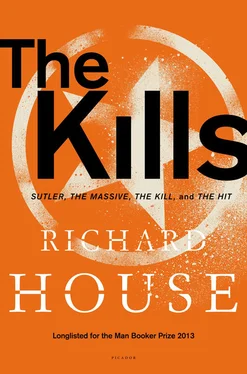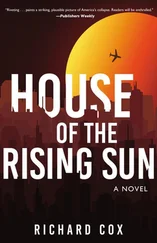Inside, through the branches and leaves of the lemon tree, he can see everyone except Henning. Rike, Isa, and Mattaus are standing, Mattaus makes his way to the door by himself.
Tomas lowers himself, then re-dresses. He dusts his trousers again, tucks in his shirt, holds back before the corner, poised to walk.
Mattaus comes out of the lobby alone and at a pace, hands rooting through his pockets as he heads down the street. The night air thick about them. Mattaus walks under the street lights to the chipper quarrel of cicadas.
Tomas looks first to the lobby to make sure no one is following with last hesitant pleas or final words. Mattaus is truly alone, and he walks fast, agitated, stops to dig through his pockets and draw out a phone, a pack of cigarettes. The man immediately lights up, attempts a call, but evidently has no answer or no signal.
The two men walk into town, there being little or no traffic until they are down at the waterfront. Mattaus holds his head back and huffs out smoke. Taxis line under the stumpy city walls, and Mattaus walks into the traffic with little caution.
He follows Mattaus along the seafront, his walk now a little more relaxed, and Tomas dithers deliberately, slipping into stalls, hangs back, side-steps tourists, hears languages: Greek, English, Russian, the signage for restaurant in three-tiers, hand-painted and sometimes neon. Happy Hour. Two-for-One. Keo. Local Wines. Kleftico. BBQ. Fish & Chips. Ahead of him Rike’s brother speaking agitated into his mobile.
They walk to the bay hotels, to the start of the resorts. At the Sovereign Tomas finally stops, and enters a club: Nightingale 1.
* * *
The Nightingale 1 is part of the Sovereign Resort complex. The club, a three storey bunker, overlooks the bay. The Sovereign Hotel has its back to the land, and during the day causes a long shadow to sweep the beach, from right to left. For the most part, the beach is obscured. There’s a joke that the hotel was built the wrong way round: the steep side facing the water, the sloped side facing the land, but Tomas thinks this isn’t the case. It can’t be. The pool, for example, being to the side of the hotel, takes the sun almost the whole day through, and this only works because the back is sloped. The rooms and balconies on the seaward side take the shade.
He watches Mattaus and can’t understand why the man stays, given how he’s ignored by the people he sits with, except one man, the manager, who buzzes about him briefly, then disappears for a good hour. These people, younger, excitable, a nervous edge to them with their sudden enthusiasms and keen bodies, they shout, bicker, go to the toilet cubicles to take drugs because this is the place for such activities, and come out energized and glassy-eyed. This group is watched over by the club’s security. As far as he can tell the club is divided into zones. This, anyway, is how it appears to be monitored. Across the club there are other such areas, although the patrons would not know it. There’s a certain balance to the excesses here. One boy, Russian, dressed in sports gear, sits at the bar, and keeps a cool eye on the room. Disengaged, but observant.
Tomas finds it hard to watch, even at this distance, and remain uninvolved. His interest at this point is on how he’s going to approach Mattaus. Speaking to him directly would be unwise, although he will already be recorded on the club’s cameras. Impatient to do something, he understands that tonight might not provide the right opportunity.
A possibility opens later in the evening, when it becomes clear to Tomas that the manager, Mattaus’s friend, is robbing the club blind.
Drinks bought at the bar pass through the register, but drinks bought from the waiting staff are unregistered, cash in hand. Money paid at the door is kept in a cash box. The arrangement appears deliberately slack, and only the manager, who collects the takings in a black sack, can have any idea what the takings are at any point, on any given night. The opportunity for the man to help himself is evident. In Tomas’s experience, when such a possibility exists, there’s usually a taker. He watches with particular interest. The manager comes by almost every sixty to eighty minutes, and counts out the money, makes a note in a small pad, then binds the cash with the note in a rubber band, which he drops into a pouch. It’s laughable. He does this without any security. No one oversees his accounting, no one offers him protection.
To test the diligence of the guards, Tomas follows the man through the club from bar to bar, up and down between the levels, and then it happens. As they walk down the stairs Tomas witnesses, to his great satisfaction, the manager reach into the pouch and help himself. So lazy, so incautious; he doesn’t even look around him. None of the guards is concerned that the manager is alone while he collects the money. At the top bar he ties a knot in the neck of the bag, then comes back down the staircase to return to his office. The only person distantly aware of Tomas’s movements is the boy at the bar.
Before he leaves Tomas steals Mattaus’s phone. This is ridiculously easy, a technical move, but not so sophisticated. The man doesn’t see him. Tomas keeps to the dark side of the stairs, comes at him from the curve. Mattaus doesn’t feel a hand slip into his pocket — and if he did feel something, this sleight of hand, in this kind of club, the gesture would translate as a small intimacy. As it stands, Tomas keeps this nice and tidy. No error involved. Mattaus knows only that a man nudged by him on the stairs, and bumped shoulders.
They leave before the club closes, Mattaus and the manager. Tomas follows after them, but outside, the manager has a car waiting, and Tomas returns to the club and sits at the bar.
The club is still busy, and while the clientele is mixed, the younger ones look worse for wear, except one, the boy in sports gear, who, like Tomas, appears to be watching.
It doesn’t take much to get the boy to talk, and Tomas learns that the manager of Nightingale 1, Kolya, runs a private game of poker. Anyone he likes the look of can play as a guest. Kolya likes to win, for many reasons, not least of all for the money, this is his one vice, the single benefit he allows himself with his work, and so the cards are stacked, and once he has their money the guest is escorted out of the club, invariably to a cash machine or a hotel to empty their safety deposit. The boy, Sol, enjoys the drama. It’s impossible to tire of that frustration, the inevitability of failure, the sheer breathlessness of their losses.
Sol goes to the toilets, and when he comes back he’s a little wired and won’t answer his phone. When Tomas asks who is calling he says Lexi, with clear dislike. Right now he’s supposed to be with Lexi, he should be in Larnaca, but Lexi, who runs Nightingale 2, is such a bore. Sol is working hard to avoid him. He doesn’t understand why the others tolerate the man and take him so seriously. Lexi runs the club in Larnaca, and Kolya runs the club in Limassol, there are other duties divided between them. Lexi manages the money, more or less, and Kolya manages the stocks and staff. Which makes them equal. Kolya is certainly more the figure you’d imagine for a nightclub manager: big, brusque, tattoos running fist to fist, while Lexi looks like he should be running a boutique. If there is a hierarchy his worry is that Lexi is possibly the man in control.
Tomas understands that the manager he was watching was Lexi.
The boy won’t drop the subject. It’s the way people listen to Lexi, give him attention, the way they really seem to like him that gets under his skin, and he doesn’t know why. Lexi is a waste of space: the man is so tedious atoms unwind around him, tire of life, cohesion, basic physical principles, everything undoes, gives up, DNA unravels, brains melt, entire species evaporate, the universe dissolves.
Читать дальше












